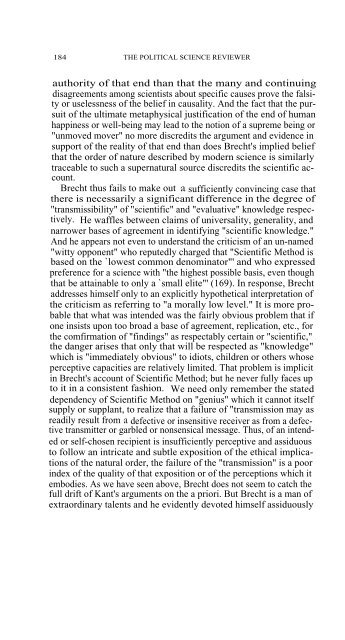ARNOLD BRECHT'S POLITICAL THEORY REVISITED Political ...
ARNOLD BRECHT'S POLITICAL THEORY REVISITED Political ...
ARNOLD BRECHT'S POLITICAL THEORY REVISITED Political ...
Create successful ePaper yourself
Turn your PDF publications into a flip-book with our unique Google optimized e-Paper software.
184 THE <strong>POLITICAL</strong> SCIENCE REVIEWER<br />
authority of that end than that the many and continuing<br />
disagreements among scientists about specific causes prove the falsity<br />
or uselessness of the belief in causality. And the fact that the pursuit<br />
of the ultimate metaphysical justification of the end of human<br />
happiness or well-being may lead to the notion of a supreme being or<br />
"unmoved mover" no more discredits the argument and evidence in<br />
support of the reality of that end than does Brecht's implied belief<br />
that the order of nature described by modern science is similarly<br />
traceable to such a supernatural source discredits the scientific account.<br />
Brecht thus fails to make out a sufficiently convincing case that<br />
there is necessarily a significant difference in the degree of<br />
"transmissibility" of "scientific" and "evaluative" knowledge respectively.<br />
He waffles between claims of universality, generality, and<br />
narrower bases of agreement in identifying "scientific knowledge."<br />
And he appears not even to understand the criticism of an un-named<br />
"witty opponent" who reputedly charged that "Scientific Method is<br />
based on the `lowest common denominator"' and who expressed<br />
preference for a science with "the highest possible basis, even though<br />
that be attainable to only a `small elite"' (169). In response, Brecht<br />
addresses himself only to an explicitly hypothetical interpretation of<br />
the criticism as referring to "a morally low level." It is more probable<br />
that what was intended was the fairly obvious problem that if<br />
one insists upon too broad a base of agreement, replication, etc., for<br />
the comfirmation of "findings" as respectably certain or "scientific,"<br />
the danger arises that only that will be respected as "knowledge"<br />
which is "immediately obvious" to idiots, children or others whose<br />
perceptive capacities are relatively limited. That problem is implicit<br />
in Brecht's account of Scientific Method; but he never fully faces up<br />
to it in a consistent fashion. We need only remember the stated<br />
dependency of Scientific Method on "genius" which it cannot itself<br />
supply or supplant, to realize that a failure of "transmission may as<br />
readily result from a defective or insensitive receiver as from a defective<br />
transmitter or garbled or nonsensical message. Thus, of an intended<br />
or self-chosen recipient is insufficiently perceptive and assiduous<br />
to follow an intricate and subtle exposition of the ethical implications<br />
of the natural order, the failure of the "transmission" is a poor<br />
index of the quality of that exposition or of the perceptions which it<br />
embodies. As we have seen above, Brecht does not seem to catch the<br />
full drift of Kant's arguments on the a priori. But Brecht is a man of<br />
extraordinary talents and he evidently devoted himself assiduously
















